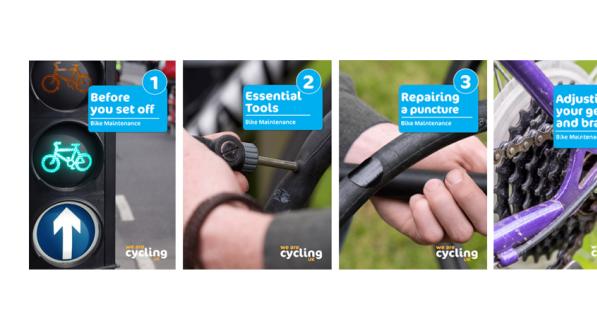How to be more confident cycling solo

Each year Cycling UK training officers help thousands of cyclists to develop their skills at a range of courses run all across the UK. From the feedback we get from attendees, we know that lots of people find that learning new skills in an encouraging and supportive group environment really aids their development.
With the charity’s decision earlier this week to cancel all group events to reduce the possible risk of further spreading of coronavirus, all planned training courses have been suspended until the end of April. But no longer attending regular group meetings doesn’t mean you have to stop cycling completely.
For many people, adjusting from riding by yourself to being surrounded by lots of other riders can be daunting. But equally for many people used to rolling up and riding in a group, going solo means you need to start thinking about all sort of considerations which were previously the responsibility of the ride leader.
If you are not a very confident rider it is important to be prepared before you set out
Andy Cremin, Cycling UK cycling development project manager
Andy Cremin, Cycling UK’s cycling development project manager in London, offers some tips for those who may have initially joined a cycle club because they wanted to build up their confidence before venturing out by themselves. “If you are not a very confident rider it is important to be prepared before you set out. So do an M check to make sure your bike is safe to ride.
“You will also want to make sure you have the right clothing for the conditions, bring some food and take your mobile phone.”
That technology could come in handy if you find yourself lost while out on your ride, but Andy says in the current situation, keeping things simple is the best policy.
Cycling UK’s journey planner tool gives detailed instructions for each part of your journey and can be customised to take you on the quietest route, avoiding the busiest roads.
“It is better not to get too far from home, so try to plan a short loop at first. You can always walk home if something goes wrong. Start with a short loop which you can expand on when you get more familiar with your route, travelling by cycle, you will discover things you can’t in a car.
“I think the roads are quieter at the moment given the current Government advice about avoiding unnecessary travel, but for someone who is not that confident yet riding on their own in traffic, they might want to find a local park or a country park if there is one nearby,” he said.
One of the advantages that group riding offers for the novice is that there is usually a more experienced rider who can help you out when you suffer a mechanical or show you where you may have been going wrong in your bike set-up.
Cycling UK offers a series of bike maintenance courses, but while these are suspended, there are a range of guides on our website which show you how to make repairs such as this how to fix a puncture video.
Finding the motivation to keep riding without the structure of a weekly club meet can also be a problem, particularly with school closures beginning next week and the pressures of shifting to working from home.
Andy says: “Set yourself a time when you are going to go out and stick to it like you would a group ride. If you are going to go first thing in the morning prepare everything the night before so you don’t waste lots of time getting ready. Tell everyone in your house when you will be riding and fit in other activities around your ride time.”
Keeping connected with your cycling circle will spur you on too; keep in touch by phone or messaging apps to share ideas for routes you find or positive thoughts during these challenging times.


